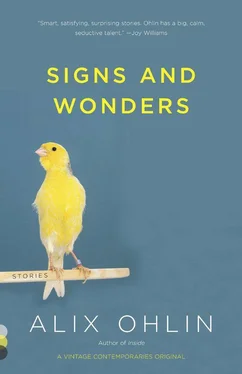Alix Ohlin - Signs and Wonders
Здесь есть возможность читать онлайн «Alix Ohlin - Signs and Wonders» весь текст электронной книги совершенно бесплатно (целиком полную версию без сокращений). В некоторых случаях можно слушать аудио, скачать через торрент в формате fb2 и присутствует краткое содержание. Год выпуска: 2012, ISBN: 2012, Издательство: Random House, Inc., Жанр: Современная проза, на английском языке. Описание произведения, (предисловие) а так же отзывы посетителей доступны на портале библиотеки ЛибКат.
- Название:Signs and Wonders
- Автор:
- Издательство:Random House, Inc.
- Жанр:
- Год:2012
- ISBN:9780307948649
- Рейтинг книги:3 / 5. Голосов: 1
-
Избранное:Добавить в избранное
- Отзывы:
-
Ваша оценка:
- 60
- 1
- 2
- 3
- 4
- 5
Signs and Wonders: краткое содержание, описание и аннотация
Предлагаем к чтению аннотацию, описание, краткое содержание или предисловие (зависит от того, что написал сам автор книги «Signs and Wonders»). Если вы не нашли необходимую информацию о книге — напишите в комментариях, мы постараемся отыскать её.
Signs and Wonders — читать онлайн бесплатно полную книгу (весь текст) целиком
Ниже представлен текст книги, разбитый по страницам. Система сохранения места последней прочитанной страницы, позволяет с удобством читать онлайн бесплатно книгу «Signs and Wonders», без необходимости каждый раз заново искать на чём Вы остановились. Поставьте закладку, и сможете в любой момент перейти на страницу, на которой закончили чтение.
Интервал:
Закладка:
An hour later we left the bar together. We started walking purposefully down the street as if we’d agreed on some destination, then stopped at a grim little park — these apparently being our venue of choice — and sat down on a bench.
Adam put his arm around me. “It’s strange to see you again,” he said, “after you broke my heart.”
“What?” I said. “Seriously?”
“Ever since you, I’ve been wary of women. I let them chase me, and usually I leave them before I get left.”
“Wait a minute,” I said. “You never even asked me out. It was just some unspoken thing.”
“I adored you. I’ve never felt that way about anyone else, before or since.”
It wasn’t the kind of thing you hear every day, and I took a moment to drink it in. “I didn’t know,” I finally said. We were meeting each other’s eyes and then glancing away, light bouncing off corners, all goose bumps and indirection.
“Of course you knew. You just acted like you didn’t.”
I didn’t know what to say next. College was all about banter and flirting but now I was used to speaking directly; my husband and I had been to couple’s therapy and learned to use I statements to express our feelings. I felt like I was attempting some sport I hadn’t played since childhood.
We went to his apartment, not far away. He poured me a glass of wine, and as he was handing it to me he kissed me on the lips. “I want to be with you,” he said.
I kissed him back, then stopped. I didn’t want him to see me naked: I had veins mapping my breasts and clustered like bruises on my thighs. My skin was creped in some places, bumpy in others. I put my hands under his shirt and felt his muscled chest and then, lower down, the sweetly reassuring padding of his paunch.
In his tiny bedroom, no larger than the dorm room of years past, we pressed ourselves close together and wrestled ourselves into submission. Afterward I exhaled deeply, satisfied and relieved that it had gone so well. Then we slept.
I could say that the poor ethics of the situation — I was making recommendations that would affect him and his friends at work — made the relationship exciting. I could say that it was like recovering some part of my lost youth. Or that it was about sex, or abandon, or fun. And all these things could be true yet still not capture the whole truth of its slippery, sexy reality. Adam and I went driving around Brooklyn in his twenty-year-old BMW, smoking cigarettes and listening to eighties music from our teenage years on cassette tapes he’d gotten free off people’s stoops. We had dinners out, in small cheap restaurants; I never cooked for him or asked him over to my place. There wasn’t much of the domestic between us, nor a sense of the future. With my husband, almost immediately after getting together we’d started playing house, cooking dinner, washing up, and watching movies at home, curled up on the couch. We had a chore wheel on the fridge. Everything was a rehearsal for the real performance of adult life. Adam and I didn’t rehearse. We never talked about where things were going or not going. We went out to dinner, the movies, to parties, then talked about the dinners and movies and parties, and after that I slid my fingers through his hair and took him to bed, or was taken.
But it would be wrong to say, because it wasn’t grown-up, or an audition for some permanent household situation, that it wasn’t also soulful and moving and important. It was. At night I sometimes ran my hands over his tattoos and marveled at his existence. I learned what he liked in bed, and when I did those things he produced this one special sound that gave me a shiver right through my chest. I was pretty close to being in love.
At work, I soon realized that Adam’s days were numbered. From all reports, he did little and had no true function, apparently hoping no one would notice. The company was riddled with these redundancies, and the resentment felt by those who had real work to do was enormous. Whenever I asked about this inequality, I got long explanations of how various departments that once were joined had since been separated, or had been separated and now were collapsed; apparently, a guy who’d left the company ten years earlier had orchestrated this particular structure, which still remained but held no actual contents. History dictated the current molds of any company, much as our adult personalities are informed by our childhood. It was my job to retrain this psychology and reform the molds. And no matter what I said about the company climate and its potential for change and growth, that Adam had done so little for so long couldn’t possibly look good.
My allegiance was temporarily torn between him and my professional discretion, but Adam won. He never asked me about my job, much less my conclusions, and after that first lunch we rarely spoke at the office. I was busy conducting interviews, and from what I heard he was busy surfing the Internet, making coffee, and using the company’s Kinko’s account to produce posters and ads for his band.
But at dinner one night, I brought it up. “Have you thought at all about what might happen at the company?” I asked, putting it as vaguely as I could.
“Not really. I’m not all that attached to the job,” he said. I knew he was lying. It protected him from having to worry too much about not being more successful; it was at once a cover story, an excuse, a disguise.
At ICS I spent the final week collating my findings, typed up my notes, and put them in a report filled with charts and graphs. I recommended certain dramatic changes, assessing their future efficiencies with a clear eye. I knew they were necessary; whether they would be implemented was another issue, but I was good at my job, a fact that brought me neither great satisfaction nor anxiety. I’d already lined up my next client, a clothing manufacturer in New Jersey, which would require me to commute on a PATH train every weekday for a month.
There was no doubt in my mind that Adam was going to get fired. I told myself this was the best thing that could happen to a thirty-seven-year-old musician: he’d get six months of unemployment benefits and during that time he could devote himself fully to his music, get to where he needed to be, or decide that he’d had enough of the struggle and reconcile himself to a regular job, one he liked enough to work hard at. I told myself I was doing him a favor, but didn’t believe it, of course, and didn’t expect that he would, either. The night before I was scheduled to hand in my report, I finally had him over to my place for dinner. I put on an apron and cooked, and he sat on my couch and laughed at me, wearing his crazy, clownish musician’s clothes, a blue guayabera and purple cargo pants.
“You’re like Betty Crocker or something,” he said, laughing.
I felt tears welling up. “Adam,” I said, “I adore you.”
“Baby,” he said, drawing me down on the couch.
“I mean it,” I said.
“I wanted you my whole life,” he said, his hands roving over my back.
There were things I needed to say and hear, and in counseling I’d learned that you shouldn’t preempt communication with sex, but at a certain point you have to say, well, fuck that, and this was such a point. With him inside me I felt centered, anchored, pinned. At the height of things I said, “I love you, I love you,” and he might have heard me, or he might’ve been too wrapped up in the sex to be listening.
He didn’t spend the night. At the office the next morning, we didn’t see each other. I packed up my files and laptop, then gave Melissa my report in her office, which was filled with pictures of cats she’d adopted or foster-cared for. Many of them were injured and ignored the camera, dismayed by the indignities of their head cones, stitches, and casts. She slapped the laminated cover of the report and said she’d have fun reading it over the weekend.
Читать дальшеИнтервал:
Закладка:
Похожие книги на «Signs and Wonders»
Представляем Вашему вниманию похожие книги на «Signs and Wonders» списком для выбора. Мы отобрали схожую по названию и смыслу литературу в надежде предоставить читателям больше вариантов отыскать новые, интересные, ещё непрочитанные произведения.
Обсуждение, отзывы о книге «Signs and Wonders» и просто собственные мнения читателей. Оставьте ваши комментарии, напишите, что Вы думаете о произведении, его смысле или главных героях. Укажите что конкретно понравилось, а что нет, и почему Вы так считаете.












